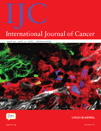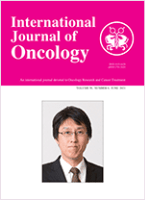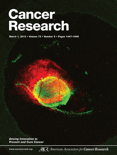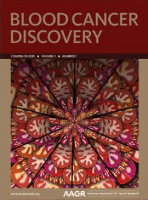
INTERNATIONAL JOURNAL OF CANCER
Scope & Guideline
Shaping the future of oncology through rigorous research.
Introduction
Aims and Scopes
- Cancer Biology and Mechanisms:
Research exploring the molecular and cellular mechanisms underlying cancer initiation, progression, and metastasis, including studies on genetic mutations, epigenetic modifications, and tumor microenvironment interactions. - Clinical Trials and Therapeutic Interventions:
Investigations into the efficacy and safety of novel therapies, including immunotherapies, targeted therapies, and combination treatments, often through multicenter clinical trials. - Epidemiology and Public Health:
Studies assessing cancer incidence, risk factors, and outcomes in diverse populations, with a focus on health disparities, prevention strategies, and the impact of public health policies. - Biomarkers and Diagnostic Tools:
Research on the identification and validation of biomarkers for early detection, prognosis, and treatment response, including liquid biopsies and advanced imaging techniques. - Translational Research:
Studies that bridge laboratory findings with clinical applications, aiming to enhance the understanding of cancer biology and improve patient outcomes through tailored therapies.
Trending and Emerging
- Immunotherapy and Immune Landscape:
Research on the mechanisms and efficacy of immunotherapies, including immune checkpoint inhibitors and CAR T-cell therapies, has surged, focusing on understanding patient responses and optimizing treatment protocols. - Liquid Biopsy and Minimal Residual Disease:
The development and validation of liquid biopsy techniques for early detection, monitoring of treatment response, and detection of minimal residual disease are rapidly growing fields, reflecting advancements in non-invasive cancer diagnostics. - Cancer Microbiome Interactions:
Emerging studies are investigating the role of the microbiome in cancer development and treatment response, highlighting the complex interactions between cancer cells and microbial communities. - Patient-Centric Approaches and Quality of Life:
An increasing emphasis on the patient experience, including quality of life assessments and patient-reported outcomes, is becoming central to cancer research, informing treatment decisions and survivorship care. - Health Disparities and Global Cancer Burden:
Research addressing health inequalities and the global burden of cancer is gaining traction, focusing on how socioeconomic factors, geography, and access to care affect cancer outcomes.
Declining or Waning
- Traditional Chemotherapy Studies:
While chemotherapy remains a cornerstone of cancer treatment, there has been a noticeable decline in studies focusing solely on traditional chemotherapeutic agents, as research increasingly shifts towards personalized medicine and targeted therapies. - Basic Cancer Genetics:
Research specifically aimed at basic genetic studies of cancer has seen a decrease, as more emphasis is placed on translational studies and the clinical implications of genetic findings. - Radiation Therapy Alone:
As combination therapies and multimodal approaches gain traction, studies focusing exclusively on radiation therapy, without the integration of systemic treatments or novel agents, have become less common. - Palliative Care Research:
While still important, the frequency of publications exclusively addressing palliative care strategies has waned, potentially overshadowed by advancements in curative and life-extending therapies.
Similar Journals

INTERNATIONAL JOURNAL OF ONCOLOGY
Connecting researchers and clinicians in the fight against cancer.INTERNATIONAL JOURNAL OF ONCOLOGY is a leading academic publication dedicated to advancing the field of cancer research and treatment. Published by SPANDIDOS PUBL LTD in Greece, this journal, with ISSN 1019-6439 and E-ISSN 1791-2423, has established itself as a reputable source of peer-reviewed articles since its inception in 1993. With an impressive Q2 ranking in both Cancer Research and Oncology categories, as well as high Scopus ranks reflecting its significant contribution to the fields of Medicine and Biochemistry, the journal offers a platform for researchers, clinicians, and students alike to disseminate their findings and engage in dialogue surrounding innovative practices and breakthroughs. Although the journal follows a traditional subscription model, it continues to attract a diverse readership interested in the latest developments in oncological research, providing essential insights into cancer biology, therapeutics, and patient care. With a commitment to excellence, the INTERNATIONAL JOURNAL OF ONCOLOGY plays a vital role in shaping the future of oncology research and is a must-read for anyone passionate about advancing cancer treatment and prevention.

BRITISH JOURNAL OF CANCER
Leading the Charge in Cancer Research Excellence.The British Journal of Cancer, published by SpringerNature, stands as a preeminent resource in the fields of Cancer Research and Oncology, with a distinguished history of publication dating back to 1947. With its Q1 rank in both categories for 2023, this journal is among the top-tier publications, offering cutting-edge research and insights into the biology, etiology, and treatment of cancer. The journal’s rigorous peer-review process ensures that readers are presented with high-quality studies that contribute to the advancement of cancer knowledge and clinical practice. Operating from the United Kingdom, it has garnered a notable impact factor and ranks impressively within Scopus, making it an essential publication for researchers, healthcare professionals, and students who are dedicated to understanding cancer's complexities. Access to the journal's articles is available in traditional formats, providing a versatile platform for disseminating pivotal research. As we move towards a future where cancer treatment and prevention remain crucial, the British Journal of Cancer continues to play a vital role in shaping the dialogue and discoveries within the oncology community.

Annual Review of Cancer Biology
Bridging Academia and Clinical Applications in Cancer ResearchAnnual Review of Cancer Biology is a pivotal journal published by Annual Reviews, specializing in the rapidly evolving field of cancer research. With an impact factor positioned in the distinguished Q1 quartile of Cancer Research, Cell Biology, and Oncology categories, this journal ensures that it showcases the highest quality of scholarly contributions. Indexed in Scopus, it ranks among the top in its fields, reflecting its strong influence and relevance, with remarkable percentiles indicating its esteemed position within the research community. Although not an open-access journal, it provides a comprehensive platform for advancing the frontiers of cancer biology through rigorously curated reviews, highlighting key developments, breakthroughs, and future directions that inform both academia and clinical applications. As a valuable resource for researchers, professionals, and students, the Annual Review of Cancer Biology serves as an essential guide for understanding and addressing the complexities of cancer biology today.

CANCER IMMUNOLOGY IMMUNOTHERAPY
Exploring Innovative Therapies for Cancer PatientsCancer Immunology Immunotherapy, published by Springer, stands as a premier journal in the fields of cancer research and immunology, holding a prestigious Q1 ranking across multiple categories, including Oncology and Medicine as of 2023. With an ISSN of 0340-7004 and an E-ISSN of 1432-0851, this journal has been a pivotal platform for groundbreaking research since its inception in 1976, continuing to provide insight into the complex interactions between the immune system and cancer. The journal's scope encompasses a wide array of topics, including novel therapeutic strategies, immunological mechanisms, and translational science aimed at advancing treatment outcomes for cancer patients. Renowned for its rigorous peer-review process and high impact factor, it attracts contributions from leading experts and researchers around the globe, positioning itself among the top-tier publications with Scopus rankings that reflect its vital role in advancing the field. Access options are generally subscription-based, ensuring a comprehensive resource for professionals and academics seeking to deepen their understanding and make meaningful contributions to cancer immunotherapy.

CANCER RESEARCH
Unlocking groundbreaking discoveries in cancer science.Cancer Research, published by the American Association for Cancer Research, is a premier journal in the field of oncology, renowned for its commitment to advancing cancer research since its inception in 1941. With an impressive impact factor reflecting its vital role in the field, this journal consistently ranks in the Q1 quartile for both Cancer Research and Oncology, positioning it among the top 7.5% of journals in these categories. The journal serves as a crucial platform for researchers, professionals, and students to disseminate and gain insights into groundbreaking studies that shape our understanding of cancer biology, prevention, diagnosis, and treatment. While it is not an open-access publication, its rigorous peer-review process ensures that only high-quality research is published, thus maintaining a standard of excellence in the scientific community. With a strong legacy and an ever-expanding influence, Cancer Research continues to be essential for anyone dedicated to the fight against cancer, showcasing cutting-edge research that drives scientific discovery and innovation.

Cancer Research Communications
Elevating cancer research to new heights.Cancer Research Communications is an esteemed journal published by the American Association for Cancer Research, a leading organization in the field of oncology. This journal aims to advance knowledge in cancer research through the dissemination of high-quality, peer-reviewed articles that cover a wide range of topics related to cancer biology, treatment modalities, and prevention strategies. As an open-access journal, Cancer Research Communications ensures that vital research findings are accessible to a global audience, promoting collaboration and innovation within the scientific community. The journal serves as a crucial platform for researchers, professionals, and students to share their insights and foster the exchange of effective cancer therapies and methodologies. With a commitment to excellence, it plays a significant role in shaping the future of cancer research and therapeutic development.

Blood Cancer Discovery
Transforming Research into Life-Saving SolutionsBlood Cancer Discovery is a premier academic journal published by the American Association for Cancer Research, dedicated to advancing the understanding of hematologic malignancies through cutting-edge research in the fields of oncology, biochemistry, and molecular biology. With an impressive impact factor and recognition as a Q1 journal across multiple disciplines, including cancer research and hematology, Blood Cancer Discovery serves as an essential platform for scholars and practitioners alike, facilitating impactful discourse and dissemination of pioneering findings. This open-access journal, established within the vibrant academic landscape of the United States, aims to bridge gaps in research and foster collaborations to ultimately enhance patient outcomes. Its Scopus rankings demonstrate its vital role in the critical advancement of cancer research and therapeutic development. By inviting contributions from a diverse range of disciplines, Blood Cancer Discovery is poised to drive innovation and inspire future advancements in understanding blood cancers.

Journal of Hepatocellular Carcinoma
Empowering researchers in the fight against liver cancer.The Journal of Hepatocellular Carcinoma is a pivotal open-access publication dedicated to advancing the field of hepatocellular carcinoma research. Published by DOVE MEDICAL PRESS LTD since 2014, this journal seeks to disseminate high-quality articles that explore innovative treatments, clinical trials, and emerging research in the context of liver cancer. With its ISSN: N/A and E-ISSN: 2253-5969, the journal is optimized for a global audience, ensuring accessibility to a broad spectrum of researchers, healthcare professionals, and students engaged in oncology and hepatology. While its Scopus ranking places it in the lower quartiles of the respective fields, the journal continues to strive for growth and visibility in a rapidly evolving landscape. The Journal of Hepatocellular Carcinoma is an essential resource for anyone seeking to enhance their understanding of liver diseases and contribute to the fight against hepatocellular carcinoma.

JOURNAL OF EXPERIMENTAL & CLINICAL CANCER RESEARCH
Advancing cancer research through innovation and collaboration.The JOURNAL OF EXPERIMENTAL & CLINICAL CANCER RESEARCH, published by BMC, is a leading open-access journal dedicated to advancing the field of cancer research and oncology. Since its inception in 1982, this esteemed journal has fostered innovation and collaboration in the scientific community, as evidenced by its outstanding impact factor and position in the Q1 quartile for both Cancer Research and Oncology categories in 2023. With a proud commitment to disseminating high-quality research, the journal operates under an open-access model, ensuring that findings are readily accessible to researchers, healthcare professionals, and students worldwide. The journal has established a distinguished reputation, ranking 23rd out of 404 in Medicine oncology and 16th out of 230 in Biochemistry, Genetics, and Molecular Biology (cancer research), showcasing its importance and influence in guiding the future of cancer treatment and research. With the aim of bridging experimental and clinical research, this journal invites submissions that push the boundaries of our understanding of cancer biology and therapy.

Molecular Cancer
Championing high-quality research for impactful outcomes.Molecular Cancer, published by BMC, stands as a premier open access journal dedicated to advancing our understanding of cancer biology, treatment, and prevention since its inception in 2002. With an impressive Q1 ranking in the domains of Cancer Research, Molecular Medicine, and Oncology, this journal occupies a significant position in the academic landscape, emphasizing high-quality research that influences clinical practices and future studies. The journal is indexed in leading databases with exceptional Scopus ranks, reflecting its rigorous peer-review process and impactful contributions to the field, where it ranks in the top 2-3 positions across various relevant categories. Based in the United Kingdom, Molecular Cancer offers researchers worldwide a valuable platform for disseminating innovative findings that drive the biomedical community forward. The journal's open access model ensures that groundbreaking research is freely accessible, fostering collaboration and knowledge sharing among professionals, students, and academics alike. Explore cutting-edge developments in cancer research through Molecular Cancer and join a community committed to improving patient outcomes and advancing scientific discovery.